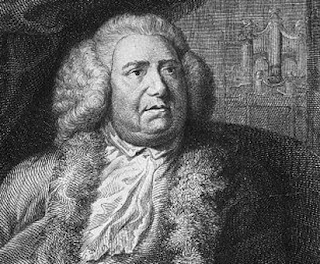Vocal Music
- Day by Day – Martin How (b, 1931)
Instrumental Music
- Voluntary in G Major – William Boyce (1710-1779)
- Variations on Jesu, Meine Freude (Hymn 701) – Johann Gottfried Walther (1684-1748)
- Sinfonia from “Sampson” – George Frederick Handel (1685-1759)
Congregational Music (all hymns from the Hymnal 1982 with the exception of those marked “x” which are from Lift Every Voice and Sing II.)
- Hymn 525 - The Church’s one foundation (AURELIA)
- Hymn 675 - Take up your cross, the Savior said (BOURBON)
- Hymn 433 - We gather together to ask the Lord’s blessing (KREMSER)
- Hymn L136 - I have decided to follow Jesus (ASSAM)
- Hymn L144 - I can hear my Savior calling (NORRIS)
- Hymn 522 - Glorious things of thee are spoken (AUSTRIA)
- Psalm 116:1-8 - tone VIIIa
In England, composers didn’t seem to pair the two forms as much as combine them into one piece called voluntaries. Originally, the term voluntary was used for a piece of organ music that was free in style and was meant to sound improvised (the word voluntary in general means "proceeding from the will or from one's own choice or consent"). [1] This probably grew out of the practice of church organists improvising after a service.
Later, the voluntary began to develop into a more definite form, like the today’s voluntary by William Boyce. It begins with an improvisatory section (prelude) before ending with a fugue – and in this instance, it’s a Double Fugue, with two subjects that are developed simultaneously.
 William Boyce was the leading native-born composer in England during Eighteenth Century, second only in popularity to that German intruder, Georg Friedrich Händel (who later Anglicized the spelling of his name as George Frederick Handel.) He was known for his set of eight symphonies, his church anthems and his odes. He also wrote three operas and some chamber music.
William Boyce was the leading native-born composer in England during Eighteenth Century, second only in popularity to that German intruder, Georg Friedrich Händel (who later Anglicized the spelling of his name as George Frederick Handel.) He was known for his set of eight symphonies, his church anthems and his odes. He also wrote three operas and some chamber music.At the age of 48, Boyce went deaf, and had to give up playing the organ. He devoted himself to editing the collection of church music which bears his name and completing the compilation Cathedral Music that his teacher Maurice Greene had left incomplete at his death. This led to Boyce editing works by the likes of William Byrd and Henry Purcell. Many of the pieces in the collection are still used in Anglican services today.
Boyce was largely forgotten after his death and he remains a little-performed composer today. The great exception to this neglect is his church music, which was edited after his death and published in two large volumes in 1780 and 1790.
The first movement (Allegro) of Boyce's Symphony No. 1 in B-flat was the first piece of music played during the procession of the bride and bridegroom at the end of the wedding of Prince Harry and Meghan Markle in 2018.
To balance the understated elegance of Boyce’s Voluntary, I will end the service with a transcription of a Sinfonia from the Oratorio Solomon by his greatest rival, Handel. This Sinfonia, which opens act 3, is more commonly known as "The Arrival of the Queen of Sheba.” It was featured at the 2012 London Olympics opening ceremony.
[1] "voluntary". Merriam-Webster Online Dictionary. Merriam-Webster. Retrieved 14 September 2018.
No comments:
Post a Comment
Note: Only a member of this blog may post a comment.